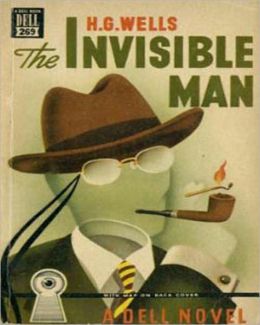Author: H.G. Wells
 |
| via Barnes & Noble |
I expected the story to be dark and creepy. However, I did not expect Wells's highly satirical depiction of those who people the English countryside. The tale is as much about the speed of gossip as it is about the arrogance of playing God. The story begins with a mysterious stranger, covered in bandages, checking into a country inn. Eventually, as a result of his own arrogance but also the townspeople's curiosity, his secret is exposed. A mad chase ensues. He stumbles upon the house of a former colleague, to whom he reveals all.
As with Robert Louis Stevenson's Jeckyll and Hyde (review here), I was inspired to read The Invisible Man by The League of Extraordinary Gentlemen by Alan Moore and Kevin O'Neill. Griffin is one of the five League members. Whereas the comic book depiction of Hyde is tweaked a little, Griffin is spot on: full-blown psychopath. The League story also incorporates Griffin's Reign of Terror concept. In the comic, he is given a first name, a luxury denied him in the novel: Hawley. In fact, it is revealed in the end that Hawley Griffin is not even the original Griffin but only a guinea pig of the original scientist. I suppose this is intended to work around the fact that Griffin (SPOILER) is killed at the end of the novel, though I think the change is unnecessary. The name Hawley is derived from the real-life murderer Hawley Crippen.
The Invisible Man is a good novel, well-worth reading for cultural literacy and geek cred. While there are certainly dark elements, the book has more humor than other Wells novels I've read: The Time Machine and The Island of Dr. Moreau. The obligatory techno-babble slows things down a bit for me but overall, it's a fun read.
I've read a lot of Wells, but I've somehow never read this one. I do have it sitting around, though, as it is an intended read.
ReplyDeleteThis is the third book of his I've read. The last of his Big 4 for me, War of the Worlds, is near the top of the to-read stack.
DeleteIn my mind, I love War of the Worlds, but it has been a long time since I read it. I actually have a compilation of his that I intend to read soonish, partially just so that I can re-read War.
ReplyDeleteI've not read Time Machine since high school. Definitely a memorable book, though I don't feel a strong need to re-read.
DeleteOne of the books I always wanted to read but never got round to. Thanks for the reminder.
ReplyDeletemood
Moody Writing
My pleasure, mood!
DeleteWhat I love about this book is the amoral nature of the guy. He's evil, but he sees it as just survival and desperation.
ReplyDeleteYes! And the reader is left to judge whether or not that amorality preceded the invisibility or occurred as a result of it. My guess is the former, but the latter certainly didn't help.
Delete